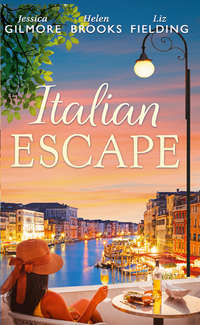
Полная версия
The Billionaire's Convenient Bride

The tycoon returns...
...with a convenient proposal!
Since Kam Faulkner’s mother unjustly lost her job at Priddy Castle after his stolen moment with the owner’s granddaughter, Agnès Prideaux, Kam has dreamed of revenge. Years later, billionaire Kam is back to buy the castle—but finds Agnès has inherited the crumbling estate! A convenient marriage could solve both their problems, but their rekindling attraction is anything but convenient... Could this be Kam’s second chance with his first love?
LIZ FIELDING was born with itchy feet. She made it to Zambia before her twenty-first birthday and, gathering her own special hero and a couple of children on the way, lived in Botswana, Kenya and Bahrain—with pauses for sightseeing pretty much everywhere in between. She now lives in the west of England, close to the Regency grandeur of Bath and the ancient mystery of Stonehenge, and these days leaves her pen to do the travelling. For news of upcoming books visit Liz’s website: lizfielding.com.
Also by Liz Fielding
SOS: Convenient Husband RequiredMistletoe and the Lost StilettoTempted by TroubleFlirting with ItalianThe Last Woman He’d Ever DateAnything but Vanilla…For His Eyes OnlyVettori’s Damsel in DistressThe Sheikh’s Convenient PrincessHer Pregnancy Bombshell
Discover more at millsandboon.co.uk.
The Billionaire’s Convenient Bride
Liz Fielding

www.millsandboon.co.uk
ISBN: 978-1-474-09089-6
THE BILLIONAIRE’S CONVENIENT BRIDE
© 2019 Liz Fielding
Published in Great Britain 2019
by Mills & Boon, an imprint of HarperCollins Publishers 1 London Bridge Street, London, SE1 9GF
All rights reserved including the right of reproduction in whole or in part in any form. This edition is published by arrangement with Harlequin Books S.A.
This is a work of fiction. Names, characters, places, locations and incidents are purely fictional and bear no relationship to any real life individuals, living or dead, or to any actual places, business establishments, locations, events or incidents. Any resemblance is entirely coincidental.
By payment of the required fees, you are granted the non-exclusive, non-transferable right and licence to download and install this e-book on your personal computer, tablet computer, smart phone or other electronic reading device only (each a “Licensed Device”) and to access, display and read the text of this e-book on-screen on your Licensed Device. Except to the extent any of these acts shall be permitted pursuant to any mandatory provision of applicable law but no further, no part of this e-book or its text or images may be reproduced, transmitted, distributed, translated, converted or adapted for use on another file format, communicated to the public, downloaded, decompiled, reverse engineered, or stored in or introduced into any information storage and retrieval system, in any form or by any means, whether electronic or mechanical, now known or hereinafter invented, without the express written permission of publisher.
® and ™ are trademarks owned and used by the trademark owner and/or its licensee. Trademarks marked with ® are registered with the United Kingdom Patent Office and/or the Office for Harmonisation in the Internal Market and in other countries.
www.millsandboon.co.uk
Version: 2020-03-02
MILLS & BOON
Before you start reading, why not sign up?
Thank you for downloading this Mills & Boon book. If you want to hear about exclusive discounts, special offers and competitions, sign up to our email newsletter today!
SIGN ME UP!
Or simply visit
signup.millsandboon.co.uk
Mills & Boon emails are completely free to receive and you can unsubscribe at any time via the link in any email we send you.
For my dearest daughter, Amy. My rock.
Contents
Cover
Back Cover Text
About the Author
Booklist
Title Page
Copyright
Dedication
CHAPTER ONE
CHAPTER TWO
CHAPTER THREE
CHAPTER FOUR
CHAPTER FIVE
CHAPTER SIX
CHAPTER SEVEN
CHAPTER EIGHT
CHAPTER NINE
CHAPTER TEN
Extract
About the Publisher
CHAPTER ONE
Two cancellations for weekend craft class. Main boiler playing up. Rained all night. Need more buckets.
Agnès Prideaux’s Journal
KAM FAULKNER LEANED forward against the steering wheel, peering through the rain blanketing the creek to catch his first glimpse of Priddy Castle.
Just over a decade ago, he’d been an angry teenager looking back out of the window of the van containing all their possessions. Angry, afraid and desperately hoping for some signal, a last-minute reprieve, until the very last moment when the island had cut off the view of the only home he’d ever known.
Cutting off the last view of the girl who had caused all the trouble.
He’d sworn then, as the ferry had docked on the far bank and his mother had forced a reassuring smile, a brave Don’t worry, we’ll manage, that he’d be back and he’d make her pay. He’d make them all pay.
It had been raining then. Not this soft stuff, little more than mist that clung to the windscreen, blurring the view. It had been drenching rain that had soaked their clothes as they’d stowed their home into a rented van.
It had run off Agnès Prideaux’s long dark hair, down her face, her soaked T-shirt clinging to her as she stood on the quayside, watching the ferry leave. Saying nothing, not even a shouted sorry even though the loss of his mother’s job, the loss of his home was all her fault.
The ferry cleared the island and his throat dried as he caught his first glimpse of his destination.
Castle was too grand a name for it.
Priddy wasn’t one of those great grey fortresses built by the Normans. It had started life as little more than a stone watchtower thrown up to guard the entrance to the river and the once important trading port upstream from raiders, would-be invaders, its fortunes ebbing and waning like the tidal river it guarded.
It had been regularly abandoned, only remembered when new dangers threatened until an enterprising man, left in possession after some forgotten crisis, had decided to stay. He’d built himself a gentleman’s residence alongside the tower, which became a decorative irrelevance until the eighteenth century when the risk of invasion from France gave it a renewed purpose.
The only invasion had been from smugglers carrying brandy and silk.
They slipped into the creek without challenge because Sir Arthur Draycott, baronet and magistrate, whose duty it was to guard the coast and hang smugglers, was in cahoots with Henri Prideaux, the most infamous smuggler in that part of the coast.
Not that Sir Arthur had lived to enjoy his ill-gotten gains. But his daughter had married the smuggler and Henri Prideaux had become king of the castle, his own title bought from equally corrupt politicians he’d done business with.
There was nothing to guard now and, with the last baronet gambling away what remained of the fortune, Priddy Castle had become little more than an upmarket B & B.
He had wondered if it would look smaller than his imagination remembered but, looming out of the mist, the rain-darkened grey tower retained every bit of its threatening presence.
Chains clanked as the old pontoon ferry reached the slipway and the ramp was lowered. He forced himself to relax and joined the vehicles heading along the quay, past the row of old fishermen’s cottages tucked in beneath the protection of the castle.
The fishermen had shaken off the shackles of the Prideaux estate when the railway had arrived on the far side of the creek, opening up the lucrative London market for their catch.
Artists, attracted by the light, and the cheap cost of living, had been drawn to the area until, around the turn of the century and it had become a well-known colony.
It had all been a bit ramshackle and scruffy when he’d left but today there were tubs of spring flowers, vivid against the freshly whitewashed walls, and an upmarket deli was doing brisk business serving the yachting fraternity that had grown up in the safety of the creek.
Even the old chandler’s store, where he’d once conducted a lively back-door trade in the sea trout he’d poached from the creek, had been given a make-over.
The number of fishing boats heading out to sea might have dwindled to a handful, but tourism and the marina had filled the gap. The town of Castle Creek, with its pastel-painted cottages rising on the opposite bank in theatrical stages, had become a desirable place to have a holiday cottage. A place to bring your children for the summer. A place to build sandcastles on the beach, mess about in boats, build happy memories if you were among the privileged few.
Kam took the lane leading up to the castle, slowing as he rounded a bend, and then pulled over in front of the cottage that had once been his home.
Tied to his mother’s job at the castle, the cottage had been neglected by a careless owner, but the windows had shone, the garden had been neat and cared for.
He’d seen photographs, but the reality shocked him. Roof tiles had slipped, there was a cracked pane stuffed with cardboard to keep out the weather. It was in the shelter of the hill, but paintwork needed constant attention this close to the sea. As for the garden. He would have to fight his way through the rank weeds to reach the front door.
If it was no use to the estate, why hadn’t they sold it? Or done it up to let as a holiday rental. Things were bad now, but they hadn’t always been.
After a moment to compose himself, he carried on up the hill.
On the sheltered, landward-side of the tower, the original house had been extended by successive generations until it had become a rambling muddle of styles, but as he swept through the gates it was the rose bricks of the Tudor frontage that appeared though the soft filter of the mist.
It looked better than he’d expected after seeing the cottage.
The gravel drive was weed-free and raked and while the drifts of naturalised daffodils that would have lit up the long curve of the drive early in spring had died back, there were early tulips glowing pink through a haze of forget-me-nots in huge tubs by the heavy oak front door.
They did a good job of distracting the eye but, this close, the stains on the brickwork where the sagging gutter had overflowed during the heavy overnight rain were obvious.
There was an arrow pointing to the designated parking area where half a dozen cars were neatly lined up. He ignored it and parked near the front door. He grabbed his bag and, ignoring the damp mist that clung to his face, stood back to get a better look at the roof.
It wasn’t only the guttering that needed urgent attention.
* * *
‘Please, Jimmy...’ Agnès Prideaux was beyond pride. She was begging. ‘I did the jiggly thing that you showed me to get it going but it just juddered a bit. It needs your magic touch.’
‘What that boiler needs is a one-way ticket to the scrapyard.’
‘It’s top of my list,’ she assured him.
Along with patching up the roof, fixing the gutters and half a dozen other problems that her grandfather had ignored for years and then, having invested all the estate’s disposable assets in a bank offering a high interest rate that anyone could see was a disaster waiting to happen, had drunk one bottle of brandy too many and died, leaving her to deal with the mess.
‘If you could just pop over in your lunch hour and do your thing, I’ll treat you to the chef’s special in the conservatory.’
This was happening so regularly that she didn’t need to mention the cash-in-hand payment that would come out of her own purse.
Jimmy sighed. ‘I’m sorry, Agnès, but the boss has laid down the law. The castle is off-limits until your account is paid.’
‘But—’
This morning had been a disaster. Without the boiler there would be no hot water for the guests after a long hard day creating their masterpieces.
‘Even in my own time,’ he added, before she could plead.
What?
‘Can he do that?’ she demanded as her struggle to maintain a swan-like calm while paddling frantically to keep ahead of her creditors, already stretched to breaking point, finally snapped. ‘The miserable old goat knows he’ll be paid as soon as the lawyers stop faffing around and settle the probate.’
She’d not only snapped but, far worse, she was lying. She was that desperate.
Probate had been granted a week ago but between her grandfather’s lack of judgement and a looming inheritance tax bill, she was about to descend into negative equity in a big way. Her only chance of keeping the castle was to convince the bank that it was a viable business, but if the boiler wasn’t fixed the comments on the review sites would ensure that there would be no more guests to feed the maintenance bills and the bank that liked to say yes would be saying not a chance...
‘Can I speak to him?’ she asked.
Another voice said, ‘The miserable old goat has you on speaker phone, Miss Prideaux, and to answer your question, yes, if Jimmy wants to keep his job, he can.’
She swallowed. ‘Mr Bridges—’
‘Priddy Castle business is always welcome,’ he said, cutting off her apology before she could even think how to recover the situation, ‘but our terms are one month. We’ll be happy to oblige just as soon as the outstanding account is settled.’
She held the phone to her ear for a long moment, but the connection had been cut. She’d been left hanging in space with nowhere to go.
‘Problem?’
Agnès jumped at the unexpected sound and swung round on her chair.
The guests were all supposed to be safely out of earshot in the barn creating collages but the man leaning against the doorframe didn’t look as if he spent his weekends messing about with scraps from the attic. At all. What was clear was that he’d been there long enough to have heard every word of her embarrassing conversation with the heating engineer.
She took a breath and did her best to arrange her face into a welcoming smile. ‘Can I help you?’
‘I have a reservation,’ he said, ‘but there’s no one at the reception desk.’
‘I’m so sorry. Suzanna must have been called away.’
‘A complaint about the lack of hot water, perhaps?’
She felt the hot flush rush to her cheeks but rose to her feet, indicating with a gesture that he should lead the way. ‘Are you here for the class?’ she asked, reminding herself not to judge by appearances. He might want to tap into his creativity. ‘It’s already started but—’
‘I haven’t come here to upcycle rubbish into art.’
He hadn’t used his fingers to make quote marks but the way he’d said ‘art’ he might as well have done. He had, however, paraphrased the poster pinned up on the wall behind her that listed the craft weekends she’d organised to bring in guests during the winter months.
His tone did suggest that he had something on his mind and her heart sank. Was this another of her grandfather’s debts come to haunt them?
She cleared her throat to ask, since there was no use putting off bad news, but he beat her to the question.
‘You don’t recognise me, Agnès?’
Distracted by the crisis with the boiler, eyes gritty from scouring the accounts in a rob-Peter-to-pay-Paul attempt to find money for the outstanding plumbing bill—not to mention the eye-avoiding embarrassment—she hadn’t given him much more than a glance. Total good hostess fail.
But then he said her name and a flicker of butterflies stirred beneath her waist.
He waited for her brain to catch up with what she had heard, what she was seeing.
A fuzz of the misty rain that had blanketed the creek since dawn clung to a familiar mop of unruly dark hair, olive skin...
The close cut beard was new but as she met the steady gaze of dark eyes, the years fell away, she was in her teens and in the desperate, painful throes of first love...
‘Kam?’ Agnès breathed the name, reached out to touch his jacket, as if to reassure herself that he was real. Curled back her fingers before they came into contact with the damp leather.
His beautiful boyish face had been battered into manhood, his shoulders had widened and the growth spurt that came later to boys had taken him past six feet. He seemed twice the size of the youth who’d been banished from the castle by her grandfather. Larger, tougher.
‘Kam Faulkner,’ she said.
‘There,’ he said, the corner of his mouth pulling up in the nearly smile that had stolen her heart the first time she’d seen him and, she discovered, still had the power to make it leap. ‘That wasn’t so difficult.’
Difficult enough. She’d been holding her breath and his name had been little more than a whisper.
‘No...’
She was still holding it. Her chest hurt and she was feeling giddy...
If she hadn’t been so distracted by the leaking roof, the dodgy boiler, the fact that the castle was on the knife-edge of financial disaster, she would have known him despite the beard, the fact that his nose had been broken and a scar now ruined the symmetry of his brows.
Breathe...
‘Breathe,’ he said, catching her elbow as she grabbed for the back of her chair.
Easier said than done when the warmth of his palm, the touch of his fingers was sending shock waves through her body.
‘Yes...sorry... I didn’t expect... I wasn’t thinking...’ She made an effort to pull herself together. She should remove her arm. Touching was... ‘It’s been a long time,’ she said, not wanting to think about what touching him had done.
A long time but eyes never changed. She had dreamed about those eyes. Dreamed about his hand taking hers. Wanting so much. Seeing that same want echoed back at her even as he stepped back, turned and walked away.
With an effort of will she removed her elbow from his hand and straightened, but as he took a step back she had to stop herself from reaching out, grabbing a handful of jacket to keep him close.
It was ridiculous. It had been years ago. She had been a teenager with a crush. But in all those years, the hideous school proms with a ‘suitable’ date, the marriage market debutant parties, no one had ever come close to that moment when he’d reached out a hand...
She swallowed, mouth dry, unable to think of anything appropriate to say.
How unexpected.
How wonderful to see him after all this time.
How disturbing to still feel the same knee-weakening desire...
That he’d reached out now meant nothing. It had been an automatic response when he’d thought she was going to fall. Nothing in his expression, in his manner suggested that this was a happy homecoming, that he was here to catch up with old friends. To catch up with her.
His smile had been fleeting, ironic rather than warm, his voice cool. And why wouldn’t it be? She was the reason he and his mother had been banished from the castle, from their home. Which begged the question—why had he come back?
‘How is your mother?’ she asked, when the silence had stretched to breaking point. Desperately falling back on the conventional. Sounding like her grandmother talking to the youth who worked in the garden.
‘It’s a little late to be asking about my mother’s health,’ he said, giving her nothing back. Nothing to work with.
‘She’s—?’ She left the question unasked. ‘Grandfather...’ Kam’s face darkened. ‘He died last year.’
‘I heard.’
He didn’t say he was sorry and his face was shadowed in the windowless little room. Unreadable. Not like the last time she’d seen him.
She’d raced to the quay desperate to tell him how sorry she was, to tell him that she’d begged her grandfather to change his mind, but she had been too late.
She’d tried to shout his name as his mother drove the van onto the ferry. The raw anger in the look he’d given her had dried the words in her mouth and she’d just stood there, a painful lump in her throat, helpless, hopeless, too miserable even to cry.
He’d learned to hide his feelings, but he had not forgotten.
Reminding herself that she was running a hotel, that he was a guest, she gathered a breath and dug deep for her professional smile.
‘Well, it’s lovely to see you after all this time. I hope you’ll enjoy your stay.’
‘I know I will. With or without hot water.’
There was a certainty in his reply, a suggestion that it had not been a passing fancy to stay at the castle.
‘It will be sorted by this evening,’ she said, with more confidence than she felt. ‘Suzanna should be back at her desk by now. Would you like coffee? Tea? A sandwich,’ she added a little desperately, when he didn’t reply.
‘Bacon?’ he suggested, his mouth twisting in a parody of a smile as he reminded her of all the times she’d brought him her breakfast bacon in a sandwich. ‘You offered the heating engineer lunch.’
She swallowed. He wanted lunch? With her? She didn’t believe it for a minute and banished the butterflies.
‘Jimmy is a lot more than a heating engineer, he’s a boiler whisperer and I was asking him to surrender his lunch hour.’ Clearly he’d heard every word and there was no point in pretending. ‘Of course, if you know anything about boiler maintenance...?’
‘I’ll pay for my own lunch but reserve a table for two in the Orangery, Agnès, and I’ll tell you exactly what I know.’
There was no upward inflection, no warmth to suggest this would be a cosy catch-up with an old friend but then Kam had never been cosy. He’d been a dangerous lad; she’d adored him on sight. As a three-year-old she couldn’t do more than watch as he’d climbed trees where he could barely reach the branches.
She’d followed him relentlessly as a five-year-old, trying to copy him, wanting to catch fish and swim in the river, spend the night out in the hides he’d built to watch owls and badgers. Wanting to be a boy like him. Taking no notice when he told her to clear off.
At six she’d cracked it with the bacon sandwich.
By the time she was fourteen she didn’t want to be a boy but knew that if she went all girly on him he wouldn’t want her around. But when she’d come home from school for the summer just before she’d turned sixteen, it hadn’t just been her. The tension had been palpable. She’d expected him to be waiting for her that evening in the hide, but he hadn’t been there, hadn’t come. He’d looked and his eyes had said yes, but he’d kept his distance and she’d thought that because of who he was, who she was, she had to make the first move...
She’d got it so wrong. Even now, the thought of what had happened brought a hot flush to her cheek.
He had been dangerous then and he was dangerous now, to her peace of mind if nothing else. Every cell in her body warned her that he wasn’t here on some sentimental pilgrimage. To relive his boyhood memories, the good ones before everything had gone splat. Whatever he wanted, she was pretty sure it wasn’t a trip down memory lane.












